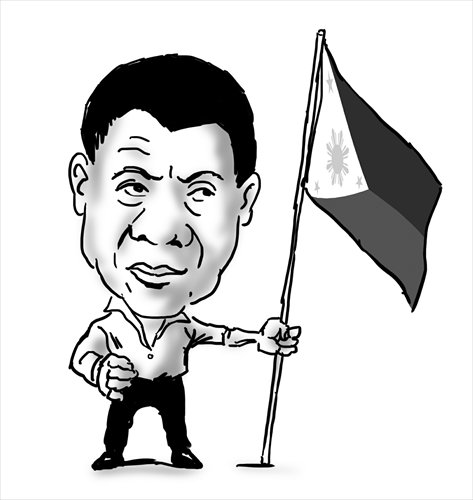Duterte may have limited room for change on maritime disputes

Illustration: Liu Rui/GT
Rodrigo Duterte, the hard-liner mayor of Davao City, seemed to be the sure winner of the presidential election in the Philippines Monday. Duterte shares different political views from the outgoing president Benigno Aquino, and how the China-Philippines relationship will develop after the election is worth exploring.
The South China Sea dispute is at the core of the relationship between Beijing and Manila, yet Duterte's comments on the issue are self-contradictory. Although he suggested settling the disputes via direct negotiations with China, and proposed the principle of shelving differences and conducting joint development in the South China Sea, Duterte also vowed to ride a jet ski to Huangyan Island and plant the national flag there.
Despite the above statements, Duterte is a more practical politician compared with his predecessor. The new government is expected to see adjustments in its South China Sea policy.
However, the room for adjustments is squeezed by the US and the Aquino administration. To begin with, Washington and Manila have reached a series of cooperative agreements including a 10-year long Enhanced Defense Cooperation Agreement and a five-year long Southeast Asia Maritime Security Initiative. By signing these deals, the White House, on the one hand, wants to draw the Philippines over to its side, and attempts to impose restrictions on the new government's foreign policies on the other.
Recently, the Pentagon, by sending warplanes in the international airspace in the vicinity of Huangyan Island, has actively intervened in the South China Sea disputes. The US is always hyping up the Huangyan Island disputes and stirring up troubles against China. The US military intervention is attempting to influence the foreign policies of the new government.
Duterte's political performances will be limited by the Aquino administration as well. The Aquino government unilaterally initiated the international arbitration in 2013 and has been obstinately pushing forward arbitral proceedings regarding the South China Sea disputes ever since.
"If the tribunal rules that the Reed Bank [Liyue Tan] belongs to the exclusive economic zone of the Philippines, then of course we have the right to proceed," Antonio Carpio, Supreme Court Senior Associate Justice, urged the new government to proceed with the arbitration. The National Task Force for the West Philippine Sea was also created by Aquino to unify national actions on the South China Sea issues.
Before leaving the office, Aquino will still strive to manipulate public opinion and provoke nationalist sentiments against China in every possible means. The Ministry of Foreign Affairs has even introduced a Philippines Diplomatic Handbook for the new government's reference. The Aquino administration is trying every means to exert influence on the new government and force it to accept the final verdict of the arbitration.
As mayor of Davao City, Duterte had limited political influence on the whole nation. Earlier, Aquino called on all presidential candidates to form a united front against Duterte. The hard-line new president is likely to face challenges from traditional elites and Manila. "The moment he [Duterte] tries to declare a revolutionary government, that is also going to be the day he will be removed from office," Senator Antonio Trillanes, a former navy officer known for the failed military uprisings in 2007 and 2003, said earlier.
With his "big mouth," Duterte is seen by many as the "Donald Trump of the Philippines." His victory reflects Philippine citizens' strong dissatisfaction with Aquino's rule. The overall situation in the Philippines has not seen significant improvements in recent years. Politically, corruption is severe. Economically, the interests of the lower-class citizens have been neglected. The nation's infrastructure is in urgent need to improve as well. The Philippines is lagging far behind its Southeast Asian neighbors. It is understandable that the Philippine citizens want a hard-line leader to change the status quo.
China has to be prepared for the negotiations with Duterte after the election. Despite the South China Sea disputes, Beijing and Manila have seen frequent people-to-people exchanges and strong economic ties in recent years. The two states should be prepared for direct communications to settle the disputes, and lead the bilateral relationship to a new level.
The author is a research fellow at the Institute of South and Southeast Asian and Oceania Studies under the China Institutes of Contemporary International Relations. opinion@globaltimes.com.cn